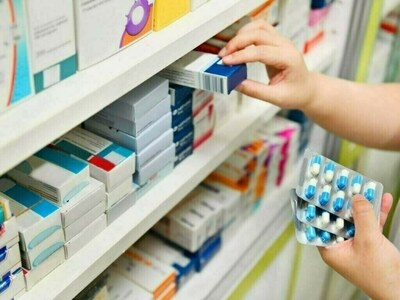Medicine Prices Surge, Raising Concerns Over Affordability
Essential medicines have experienced a significant increase in prices recently, potentially making crucial treatments inaccessible for many individuals.
An informal survey indicated that medicine costs have increased between 8 and 35 percent in the last four months.
For example, Cortisporin eye ointment has jumped from Rs48 to Rs65, Caflam tablets from Rs337 to Rs371 per pack, Galvus Met tablets from Rs3,100 to Rs3,410, and Methycobal tablets from Rs250 to Rs300 per pack.
Other medicines, like Surbex Z tablets, have increased from Rs370 to Rs440, Sunny D capsules from Rs375 to Rs450, Lerace D tablets from Rs550 to Rs664, Tricardin tablets from Rs995 to Rs1,400, Ciproxin tablets from Rs550 to Rs708, Panadol Extra from Rs40 to Rs50, and Perno injections from Rs2,700 to Rs3,352.
Traders reported that these are vital medicines for treating fever, heart conditions, infections, weakness, and eye issues.
They added that numerous medications, particularly those for long-term illnesses, have become too expensive for the average person.
The previous caretaker government, under Anwaarul Haq Kakar, approved a deregulation policy in February 2024, following a recommendation from the Ministry of National Health. This allowed pharmaceutical companies to adjust prices for non-essential drugs not included in the National Essential Medicines List (NEML).
The purpose of the deregulation policy was to support the struggling pharmaceutical industry, which was facing rising production costs, by ensuring the availability of financially unsustainable medicines.
Shaukat Awan, a pharmacy chain manager, stated, “Medicine prices are rising monthly or even weekly. Patients are consistently facing higher bills.”
He emphasized that prices for drugs treating chronic conditions like diabetes, hypertension, cardiovascular issues, and mental health, as well as common cold and flu remedies, are continuously increasing.
Pharmacy owners are also feeling the consequences. Tariq Hussain, a medical store owner, mentioned that numerous patients are now reducing their medicine intake because of high costs.
“Many individuals are taking 15 or 20 tablets instead of the prescribed 30 due to affordability issues. They are requesting more discounts, which we cannot provide,” he explained.
The price of antibiotics, a standard pharmacy item, has also increased significantly, making them harder for patients to afford.
A doctor verified this critical situation, noting that patients are asking for fewer prescriptions due to financial limitations.
The absence of a national health insurance system worsens the problem, as most healthcare expenses in Pakistan are paid out-of-pocket.
Dr. Ikram Shah said, “The absence of financial support mechanisms means that these price increases are devastating for patients who rely on daily medication, especially laborers and daily wage earners.”
The Senate Standing Committee on National Health Services and Regulations recently addressed this issue, expressing worries about cartelization in the pharmaceutical sector. The committee noted that while the government deregulated prices to foster fair competition, the pharmaceutical industry formed cartels and implemented unprecedented price increases.
Committee Chairman Senator Aamir Waliuddin stated that these price hikes driven by profiteering are unacceptable at the cost of public health.



Comments (0)
No comments yet. Be the first to comment!
Leave a Comment